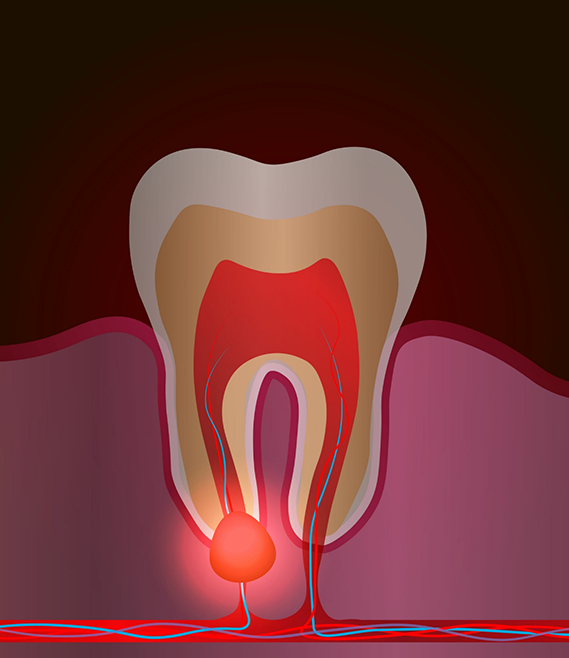Root Canal Treatment – Jacksonville, FL
Addressing Your Tooth Pain Directly at Its Source
Root canals have a very unfair reputation; despite what you’ve heard on television or through the grapevine, this type of treatment is actually one of the best ways of addressing oral pain and salvaging a compromised tooth. Get in touch with our team right away if you believe you might need root canal treatment in Jacksonville; we’ll work quickly to ensure that your tooth isn’t in jeopardy and you’re able to enjoy a happy, healthy smile moving forward!
Why Choose Baldwin Dental of Jacksonville for Root Canal Treatment?
- Multiple Forms of Dental Sedation Offered
- Skilled Dental Team With Years of Experience
- Comfortable Office With Patient-Friendly Amenities
Do You Need Root Canal Treatment?

Inside every tooth is a mass of nerves located in what’s referred to as the pulp (or innermost chamber). When there’s an infection present in this area, several abnormal symptoms can arise, like:
- Persistent sensitivity
- Pain when biting down
- Tender, red, or bleeding gums
- Dark discoloration on the tooth in question
There are also some cases where patients don’t experience any pain, discomfort, or sensitivity. That’s why it’s so important to visit us every six months for a dental checkup. During the exam, we will review your latest X-rays and visually examine each of your teeth to make sure they are healthy and, if they aren’t, that a plan is put in place to address the root of the problem.
The Root Canal Process

As the infection spreads, it can threaten the entire structure of the tooth, possibly prompting extraction. Root canals aim to prevent this from happening. If we determine that this emergency dental procedure is needed, we will first numb your mouth so you don’t feel any pain as we work to eliminate the infection. Then, we will remove the diseased and decayed tissue before the tooth is sanitized, filled, and sealed. The last step is covering it with a dental crown. This allows the natural tooth to remain a healthy part of your smile, which is always a preferred outcome in dentistry!
The Benefits of Getting a Root Canal

Let’s start with one of the biggest benefits of root canal treatment (outside of the fact that it’s incredibly effective): it’s completely painless thanks to powerful numbing agents. Since tooth-colored restorations are used, no unwanted attention will be drawn to your smile moving forward either. At the end of your final appointment, you’ll have a healthy, pain-free smile!
Understanding the Cost of Root Canal Treatment

One of the top reasons why patients avoid visiting the emergency dentist, even when they’re in pain, is because they’re worried about the cost that they’ll be quoted. Our team at Baldwin Dental of Jacksonville will help make dealing with your toothache as seamless and simple as possible by filing insurance claims on your behalf. We’ll also clearly communicate any out-of-pocket expenses that may apply and highlight other ways to help lower your up-front cost, like with financing.
Factors That Influence the Cost of Root Canal Treatment

There are multiple factors that will affect the cost of root canal treatment in Jacksonville, including:
- The location of the tooth receiving treatment. The molars are often much more complicated to treat with root canal therapy than other teeth, like the incisors. This is because their root systems are much more complex, meaning more time and attention will need to be paid to ensure that all of the tooth’s pulp is removed.
- The progression of the infection. If a tooth infection has not been addressed and left to progress, the treatment could be more involved.
- Any additional required services. Typically, after a tooth has received root canal treatment, it will be topped off with a protective dental crown, which would incur a separate cost.
Is It Cheaper to Extract a Tooth?

Although a tooth extraction could be less costly than root canal treatment when you only look at the price tag, that’s not exactly the case. When you extract a tooth that can be repaired, you’ll need to replace it in order to maintain the alignment of your teeth and fill in the gap in your arch. These treatments, like dental bridges and dental implants, are much more costly than a root canal. Furthermore, it’s always a better idea to preserve your natural teeth whenever possible, because nothing compares!
Does Dental Insurance Cover Root Canals?

If you have dental insurance, you’ll be pleased to know that your plan will cover a portion of the cost of your root canal in Jacksonville. However, typically, plans will only pay about 50 percent of the overall price tag, leaving you to pay for the other half. Our team at Baldwin Dental of Jacksonville will complete a benefits check before your procedure so we can find out how much your dental insurance will cover. This will allow you to budget for any expenses that you’ll be responsible for.
Options for Making Root Canals More Affordable

If you’re uninsured or underinsured, there are a couple of other options that our team offers to help you pay for treatment. In addition to filing dental insurance claims on your behalf, we offer flexible financing through CareCredit. This will allow you to make smaller monthly payments for your treatment. If you’re uninsured, we recommend checking out our in-house membership plan that gives you access to discounts and covers all of your routine preventive dental care throughout the year.
Root Canal FAQs
How Long Does It Take to Recover from a Root Canal?
While the recovery timeline varies from person to person, most patients can expect to return to work or school the next day. However, if your job involves physical labor, it’s best to rest for at least two to three days. Vigorous activity or exercise can slow healing.
Mild soreness is normal for a few days, and any pain can be managed with prescribed or over-the-counter medication. Your diet should consist of mainly soft foods and avoid chewing on the treated side. Continue your oral hygiene routine as normal, but gently brush and floss around the affected tooth. If pain worsens after three days or you notice signs of infection like swelling or fever, contact us right away for assistance.
Can I Eat Before a Root Canal?
It depends on your treatment plan! If you’re being sedated, we may ask you to avoid eating for a few hours beforehand to reduce the risk of nausea. If no sedation is involved, it’s a good idea to eat a healthy meal a couple of hours before your appointment – just remember to brush your teeth first! Your mouth will be numb afterward, making eating difficult for a while. Also, avoid alcohol for 24 hours before your procedure, as it can interfere with the anesthesia.
What Happens If You Wait Too Long for a Root Canal?
If you wait too long to get a root canal, the infection in your tooth will only get worse, as teeth can’t heal themselves. Even if the pain goes away, it doesn’t mean the problem is gone. In fact, this often signals that the infection has killed the tooth’s nerves. Delaying treatment can allow the infection to spread to your gums, jaw, other teeth, or even the rest of your body, leading to serious health issues. For some patients, the tooth may become so damaged that it can’t be saved and must be extracted. That’s why prompt treatment is the best way to protect your health.
Are Root Canals Safe During Pregnancy?
Yes, root canals are generally considered safe during pregnancy. Both the American Dental Association and the American Congress of Obstetricians and Gynecologists agree that, with proper precautions, this treatment poses minimal risk. Modern shielding protects your baby during X-rays and local anesthetics are safe to use.
Ideally, you should schedule your root canal during the second trimester – the first trimester carries more risk and the third can be uncomfortable. Stress from pain can affect the baby, so be sure to manage your discomfort appropriately with approved pain relievers. We can also prescribe pregnancy-safe antibiotics if needed to prevent infection. Always discuss your options to ensure the safest care!

